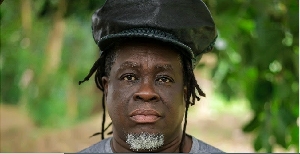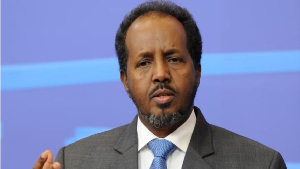A GNA feature by Audrey Dekalu
Accra, July, GNA - Akua Akyere, a 38- week pregnant woman went into labour and was rushed to the hospital. Since the labour of the expectant mother was not progressing as expected the doctors decided to carry a caesarean section on her.
Luck, however eluded Akua when the hospital found out that she was HIV positive. The zealot medical team that was determined to save her life started giving excuses and the plain lie was that there was no doctor to attend to her.
"They made me feel untouchable, dirty and as if I was not a human being anymore. The result of my test suddenly changed my status to unwanted= , not worthy of basic medical treatment. Till this day I find it difficult to visit the hospital because it reminds me about the fearful doctors afraid t= o deliver my baby because of my status," she said.
Aba Mansa was a waakye (locally cooked rice and beans) seller who had so many customers until her husband got very ill and died. Suddenly the fortunes of Aba, the bread winner started dwindling as people stop patronising her food.
The situation persisted until she got wind that words were making the rounds that her husband died of HIV and that there was the likelihood that she and her children were equally infected.
Not quite long the co tenants of Aba started discriminating against her and her children and finally they had to leave the house. The story of Akua and Aba is a summary of the discrimination people living or suspected to have contracted HIV and AIDS are being subjected.
This is often referred to as "the third epidemic" of the disease, the firs= t being the spread of the virus itself, followed by the clinical disease- Acquired Immune Deficiency Syndrome (AIDS) AIDS related stigma and discrimination refers to prejudice, negative attitudes, abuse and maltreatment directed at people living with HIV and AIDS (PLWHAs) leading to the victims being shunned by family members, peers and the wider community. The poor treatment of PLWHAs in health institutions and other public facilities tend to erode their fundamental human rights and inflict psychological damage on them.
AIDS stigma and discrimination exist worldwide, although they manifest themselves differently across countries, communities, religious groups and individuals. Stigma not only makes it more difficult for people trying to come to terms with HIV and how to manage their illness, but also interferes with attempts to fight the AIDS epidemic worldwide.
On the national level, the stigma associated with HIV can deter governments from taking fast, effective action against the epidemic, whilst on the personal level it can make individuals reluctant to access HIV testing, treatment and care.
UN Secretary-General Ban Ki Moon observed: "Stigma remains the single most important barrier to public action. It is a main reason why too many people are afraid to see a doctor to determine whether they have the disease, or to seek treatment if so. It helps make AIDS the silent killer, because people fear the social disgrace of speaking about it, or taking easily available precautions. Stigma is a chief reason why the AIDS epidemi= c continues to devastate societies around the world."
HIV has been with mankind for nearly 30 years and yet the myth around the disease is unbridled, the misperceptions ubiquitous and the ignorance very pervasive hence the suffering of PLWHAs in silence. "We can stop these tears. We can stop them by acknowledging that HI= V affects people from all races, creeds and socio-economic classes. We can stop them if we approach HIV just as we do diabetes and hypertension. We ca= n stop them if we respond to HIV-positive people without judgment or criticism. I know we can conquer HIV stigma because it is our own creation. But to be successful we must talk about HIV in our communities, in our churches, in our social circles and in our homes. Let's each one do his p= art to free them from their secret burden because I am tired of watching them cry," says Dr Lisa K. Fitzpatrick Associate Professor of Medicine, Howard University Consultant and Senior Technical Advisor, DC Department of Health= ..
"In Ghana, stigma faced by PLWHAs has been identified as one of the m= ain challenges to the country's national response and that these challenges a= re making it difficult to overcome the epidemic despite efforts of awareness and other interventions," Dr Kyei Faried, Director of the Disease Control Unit of the Ghana Health Service disclosed at a stigma workshop for the media.
It was organised by the West Africa AIDS Foundation and the International Health Care Centre.
Dr Faried noted that although general awareness of HIV and AIDS was high, in-depth knowledge was still very low leading to stigma. According to him HIV-related stigma devalues people living with the disease, which he described as 93unfair and unjust". He appealed to the media not to twist stories on HIV to make them soun= d judgmental of those infected.
Surprisingly stigma does not exist in hostile environment but sometime= s in caring atmospheres where one would least expect it.
Testimonies by PLWHAs points out that family member who should provide genuine and compassionate care sometimes become the worst perpetrators of stigma.
Caregivers who should offer love and support are sometimes guilty of exhibiting stigmatising and discriminating behaviours. Some members of the clergy are also not exempted from the practice since some of them condemns and stigmatise PLWHAs as promiscuous. It is only prudent for one to look forward to the day when HIV would be seen as a chronic and treatable disease---a disease that can inflict any person. Stigma kills than the epidemic itself and we need to put a smile on th= e faces of PLWHAs because the virus is just like any other chronic disease that can be managed.
Opinions of Monday, 1 August 2011
Columnist: GNA














